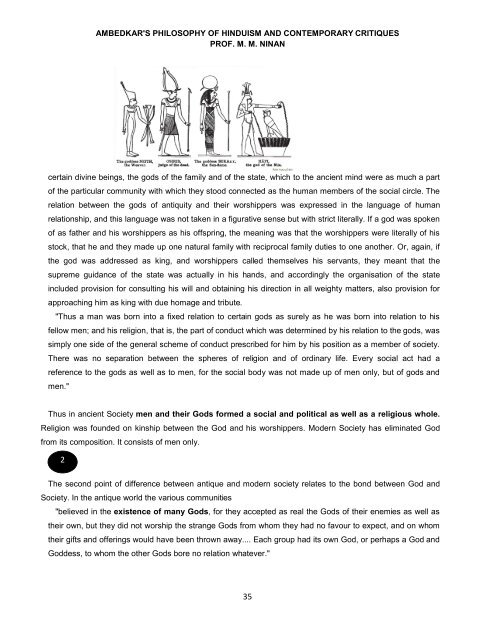Ambedkar-Philosophy of Hinduism
You also want an ePaper? Increase the reach of your titles
YUMPU automatically turns print PDFs into web optimized ePapers that Google loves.
AMBEDKAR'S PHILOSOPHY OF HINDUISM AND CONTEMPORARY CRITIQUES<br />
PROF. M. M. NINAN<br />
certain divine beings, the gods <strong>of</strong> the family and <strong>of</strong> the state, which to the ancient mind were as much a part<br />
<strong>of</strong> the particular community with which they stood connected as the human members <strong>of</strong> the social circle. The<br />
relation between the gods <strong>of</strong> antiquity and their worshippers was expressed in the language <strong>of</strong> human<br />
relationship, and this language was not taken in a figurative sense but with strict literally. If a god was spoken<br />
<strong>of</strong> as father and his worshippers as his <strong>of</strong>fspring, the meaning was that the worshippers were literally <strong>of</strong> his<br />
stock, that he and they made up one natural family with reciprocal family duties to one another. Or, again, if<br />
the god was addressed as king, and worshippers called themselves his servants, they meant that the<br />
supreme guidance <strong>of</strong> the state was actually in his hands, and accordingly the organisation <strong>of</strong> the state<br />
included provision for consulting his will and obtaining his direction in all weighty matters, also provision for<br />
approaching him as king with due homage and tribute.<br />
"Thus a man was born into a fixed relation to certain gods as surely as he was born into relation to his<br />
fellow men; and his religion, that is, the part <strong>of</strong> conduct which was determined by his relation to the gods, was<br />
simply one side <strong>of</strong> the general scheme <strong>of</strong> conduct prescribed for him by his position as a member <strong>of</strong> society.<br />
There was no separation between the spheres <strong>of</strong> religion and <strong>of</strong> ordinary life. Every social act had a<br />
reference to the gods as well as to men, for the social body was not made up <strong>of</strong> men only, but <strong>of</strong> gods and<br />
men."<br />
Thus in ancient Society men and their Gods formed a social and political as well as a religious whole.<br />
Religion was founded on kinship between the God and his worshippers. Modern Society has eliminated God<br />
from its composition. It consists <strong>of</strong> men only.<br />
2<br />
The second point <strong>of</strong> difference between antique and modern society relates to the bond between God and<br />
Society. In the antique world the various communities<br />
"believed in the existence <strong>of</strong> many Gods, for they accepted as real the Gods <strong>of</strong> their enemies as well as<br />
their own, but they did not worship the strange Gods from whom they had no favour to expect, and on whom<br />
their gifts and <strong>of</strong>ferings would have been thrown away.... Each group had its own God, or perhaps a God and<br />
Goddess, to whom the other Gods bore no relation whatever."<br />
35


















